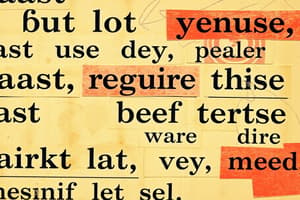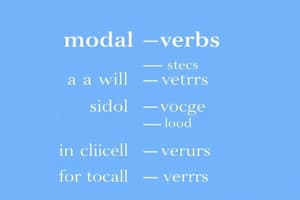Podcast
Questions and Answers
What does 'could have' express in a sentence?
What does 'could have' express in a sentence?
Which phrase indicates a past action that was a poor choice?
Which phrase indicates a past action that was a poor choice?
In which scenario would you use 'couldn't have'?
In which scenario would you use 'couldn't have'?
What does 'should have' imply?
What does 'should have' imply?
Signup and view all the answers
What is functionally equivalent to 'shouldn't have + past participle'?
What is functionally equivalent to 'shouldn't have + past participle'?
Signup and view all the answers
Study Notes
Using "could have" + past participle
- Used to express possibility in the past.
- Indicates something was possible but didn't happen.
- Example: She could have called and spoken to Mona.
Using "couldn't have" + past participle
- Used to express impossibility in the past.
- Indicates something wasn't possible.
- Example: She couldn't have been at the supermarket at 8.00, because he was in the café.
Using "should have" + past participle
- Used to express a suggestion for a better past action or choice.
- Implies regret or criticism about a past action.
- Example: You should have read that valuable book.
Using "shouldn't have" + past participle
- Used to express the idea that a past action was a bad decision.
- Implies a negative consequence or regret.
- Example: She shouldn't have got upset.
Note
- "should/shouldn't have + past participle" is interchangeable with "ought/ought not to have + past participle".
Studying That Suits You
Use AI to generate personalized quizzes and flashcards to suit your learning preferences.
Description
This quiz covers the usage of 'could have' and 'should have' alongside past participles. Test your understanding of expressing possibility, impossibility, and suggestions in past contexts. Explore how these modal constructions convey regret or alternative actions in English.




